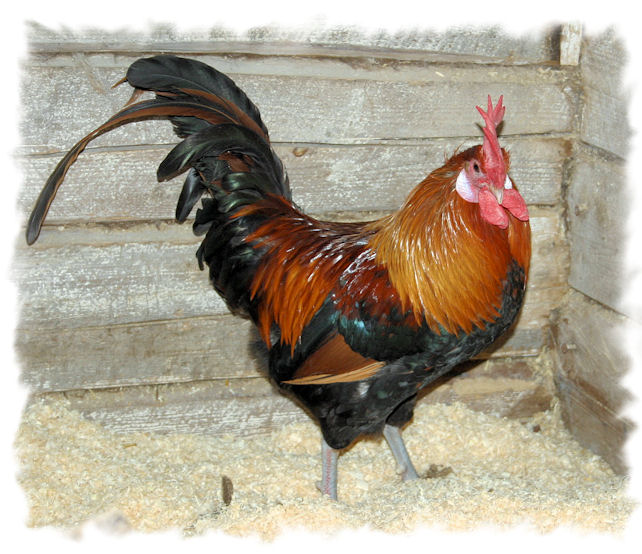
 3
3




“UNLESS someone like you cares a whole awful lot, nothing is going to get better.
It’s not.”
-Dr. Seuss
 10
10




Monika Vee wrote:We have a Rhode Island Red rooster which has proven to be quite brazen showing hostility towards my husband & I; we all treat them well and they are well cared for.
BUT! The rooster has gotten too aggressive and will no longer be with us soon.
We are keeping all medium chickens and we try to keep our flock filled with 1) Good layers and 2) various coloration eggs.
I know that the better layers tend to be a bit more anxious/flighty compared to lower-laying breeds but we’re trying to decide on what direction to go with our next attempt(s) at finding roosters that are good around the children and still have genetics for offspring to lay better or at least have colorful eggs (if not both)…
We’re looking at a few possibilities including Easter Eggers, Orpingtons, Cochins, Australorps, & Delawares…
If anyone has had any high-success rates with roosters good with children please let me know!
A build too cool to miss:Mike's GreenhouseA great example:Joseph's Garden
All the soil info you'll ever need:
Redhawk's excellent soil-building series





 2
2




Invasive plants are Earth's way of insisting we notice her medicines. Stephen Herrod Buhner
Everyone learns what works by learning what doesn't work. Stephen Herrod Buhner

 3
3




 4
4




Country oriented nerd with primary interests in alternate energy in particular solar. Dabble in gardening, trees, cob, soil building and a host of others.
 7
7




"When the whole world is running towards a cliff, he who is running in the opposite direction appears to have lost his mind." C.S. Lewis
Visit https://themaineingredient.com for organic, premium dried culinary herbs that are grown, processed, and packaged in the USA.
 6
6




Our Destination is Our Legacy
www.peacefulvalleyfold.com
 2
2




Elena Sparks wrote: One peace of advice about raising roosters: don't get to familiar with them. I know that sounds counter productive, and I totally get that, but this is coming from lots of "male animal" experience. If you spend tons and tons of time with them, and let them get completely comfortable with you, they will see you as a part of the flock. That means that you belong in the flock hierarchy, of which the rooster wants to be the head, and you will become a threat for his dominance, and he will treat you like a rival rooster (aka attacking you). There is a balance though. Spend time in the flock, let them get used to you, but don't get to friendly with the rooster (do whatever you want with the hens). You don't want to be seen as a predatory threat, so do spend some time out there, but don't slip into being too comfortable or he won't respect you as the lead of the flock. Hopefully that helps! Good luck finding a good rooster, and let us know what you decide on!
A build too cool to miss:Mike's GreenhouseA great example:Joseph's Garden
All the soil info you'll ever need:
Redhawk's excellent soil-building series






 3
3




There is nothing so bad that politics cannot make it worse. - Thomas Sowell
Everything that is really great and inspiring is created by the individual who can labor in freedom. - Albert Einstein
 4
4












 3
3




Kaarina Kreus wrote:A rooster is the Alpha male who protects his hen. And enjoys some friends-with-benefits
If we want an eunuch who cuddles to us, well, get a dog. Let roosters be what they are - vicious protecters of their flock.
There is nothing so bad that politics cannot make it worse. - Thomas Sowell
Everything that is really great and inspiring is created by the individual who can labor in freedom. - Albert Einstein
 3
3




Kristine Keeney wrote:
Kaarina Kreus wrote:A rooster is the Alpha male who protects his hen. And enjoys some friends-with-benefits
If we want an eunuch who cuddles to us, well, get a dog. Let roosters be what they are - vicious protecters of their flock.
That's all well and good, but if you could have an alpha male who protected the flock, and knew that it was okay to cuddle, or at least not attack the children, wouldn't that be preferable?
The thing with animals is that they can be trained. They can be managed. And you can select for good traits and not for bad ones.
Defending the flock is fine. Attacking children, or me, is not. I will not keep a rooster who attacks people, but I will keep one who knows when to mind his manners.
Like a Livestock Guardian dog who knows the difference between those it protects and those it defends against, right? There's little difference except in the size and species of the defender.
~~~~~~~~~~~~~~What are you going to do now?~~~~~~~~~~~~~~~
"Goin straight Bob. I don’t know, get a job, find myself a gal.. or, I dunno what people do nowadays, build-a, uh, a barn maybe, paint the barn with the gal, put the gal in the barn, you know; American dream."
 4
4




Our Destination is Our Legacy
www.peacefulvalleyfold.com
 1
1















Sergio Cunha wrote:You can have two roosters, and castrate one of them. The castrated rooster will protect the chicks, even watching the sky and warn the hen about hawks and other predators. It's better if the two roosters are grown together at the same chicken coop or backyard (same age). This is to avoid the non castrated fighting the castrated one.
* Edit to say that the castrated one will change his bahaviour, being very protective of the chicks.
There is nothing so bad that politics cannot make it worse. - Thomas Sowell
Everything that is really great and inspiring is created by the individual who can labor in freedom. - Albert Einstein







 3
3




Elena Sparks wrote:This isn't as much of an issue for chickens as it is for larger animals, so you don't have to be as careful. Just don't spend EVERY second of the day coddling them.
...
If all they see is you, and you interact with them more than they interact with the other chicks, then they will associate you with their same species. I mostly gave this advice because I wanted people to be aware of the risks of over handling their male animals. Roosters aren't the worst, and it's definitely harder to over handle them, but I have done it in the past (which led to a really mean rooster who would chase me around until I was out of the pen). I've seen tons of videos on social media where people have their "little Buster, my friendly bull," and they were allowing him to be so friendly that he had no limits, which is SUPER dangerous, and no-one seems to understand why.
There is nothing so bad that politics cannot make it worse. - Thomas Sowell
Everything that is really great and inspiring is created by the individual who can labor in freedom. - Albert Einstein

|
My previous laptop never exploded like that. Read this tiny ad while I sweep up the shards.
Freaky Cheap Heat - 2 hour movie - HD streaming
https://permies.com/wiki/238453/Freaky-Cheap-Heat-hour-movie
|







